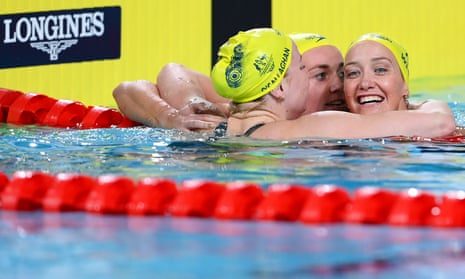When Ariarne Titmus looked across her lane she didn’t just see her training partner Mollie O’Callaghan. She saw herself. “She’s young. She’s feisty. She’s hungry,” Titmus said of O’Callaghan. “She’s what I was like – and I am still like that.”
The Australians turned Friday night’s women’s 200m freestyle final at the Commonwealth Games into a classic. Titmus, the Olympic champion, was under world-record splits at the last turn. Then she saw a steaming 18-year-old O’Callaghan.
Titmus was expecting it. So she had turned her head to the other side when breathing just so she could watch O’Callaghan. “I was breathing the other way on the third lap,” Titmus said. “I thought that was when I could put my foot down and make a move. Then I saw her on the turn. And thought ‘she’s there’.”
Titmus summoned her renowned fighting spirit to hold off the precocious teen by the proverbial fingernail, winning by just 0.12 seconds. Both Titmus and O’Callaghan were under the previous Commonwealth Games record by almost a second.
“I knew coming in, she would be there,” Titmus said of the emerging force known as Mollie O. “She has been improving every day. It’s exciting for her to keep me on my toes.”
Madi Wilson finished third to ensure an all-Australian podium.
O’Callaghan began swimming at the age of four and entered her first competition three years later. As the youngest member of the Tokyo Olympics squad, the Queensland prodigy produced an incredible swim in the heats of the 4x100 freestyle relay in Tokyo to secure a gold medal as part of the Australian team. In June, with Titmus at home, she became the 100m freestyle champion at the Swimming World Championships in Budapest, becoming the youngest winner of the event in 31 years.
Titmus and O’Callaghan are both coached by Dean Boxall. “It’s weird because he’s giving us both race plans to win but it’s just whoever performs at the end of the day,” O’Callaghan said. “Arnie has a lot of experience racing the 200 and it’s just amazing how close I got. I’m pretty happy with that.”
Meanwhile, Emma McKeon is on the cusp of Commonwealth Games history but the Olympic champion insists she “hasn’t done the maths” as a record 10th and 11th gold beckon in Birmingham.
McKeon, now a regular on both front and back pages of newspapers thanks to her feats in the pool and blossoming romance with Australian swimmer Cody Simpson, collected a ninth Games title on night one of the program at the Sandwell Aquatic Centre on Friday, anchoring the mixed 4x100m freestyle relay to gold.
Two more golds - the 100m butterfly and women’s 4x100m freestyle relay - are up for grabs on Saturday. Victory there would push McKeon level and then past champions Ian Thorpe, Susie O’Neill and Leisel Jones, who are clinging to the Australian record of 10 Commonwealth Games titles.
A nine-event schedule in her first international meet since Tokyo’s Games last year means McKeon could leave Birmingham well clear of the legendary trio.
“No I haven’t done the maths,” she told reporters. “I don’t read the news that you guys write; even in Tokyo (where she won a Games-high four gold and three bronze) it wasn’t something I set out to do.
“Here it’s just a stepping stone and I’m not looking at medal tallies,” McKeon insisted. “Incredible swimmers have done that in the past and they’re the ones that have inspired all of us. I’m not setting out to break any of that, just do my best and see what I’m capable of.”
McKeon took time off after Tokyo which she said was necessary for a mental reset ahead of the Birmingham Commonwealth Games and Paris 2024 Olympics. According to longtime coach Michael Bohl, after winning four gold and three bronze medals in Tokyo to become Australia’s most-decorated Olympian, McKeon considered retirement rather than commit to another four-year Olympic cycle.
“She had three months out of the water, we just didn’t know what she was going to do,” Bohl told reporters. “When you get to 28 there are other things to do. She’s finished her degree now, she studied public health, so she had to make a decision whether she would choose that path of work or whether she still had competitive ambitions in the pool.
“When you have such a good meet, it’s hard to back up. It’s not physical, it’s mental. You have to be in the right mental headspace to front up again. She thought about the pros and cons and in the end felt like she still had some improvement,” Bohl said.
Now, despite a heavy schedule that also includes 50m freestyle heats and semi-finals on Saturday, McKeon says her goal is to enjoy the return to the pool.
“I haven’t raced in a long time, it’s getting back into the swing of it and I’m treating it as the first stepping stone back again on the way to Paris,” she said. “It’s good to be back, feel those nerves again that I haven’t felt in a long time.
